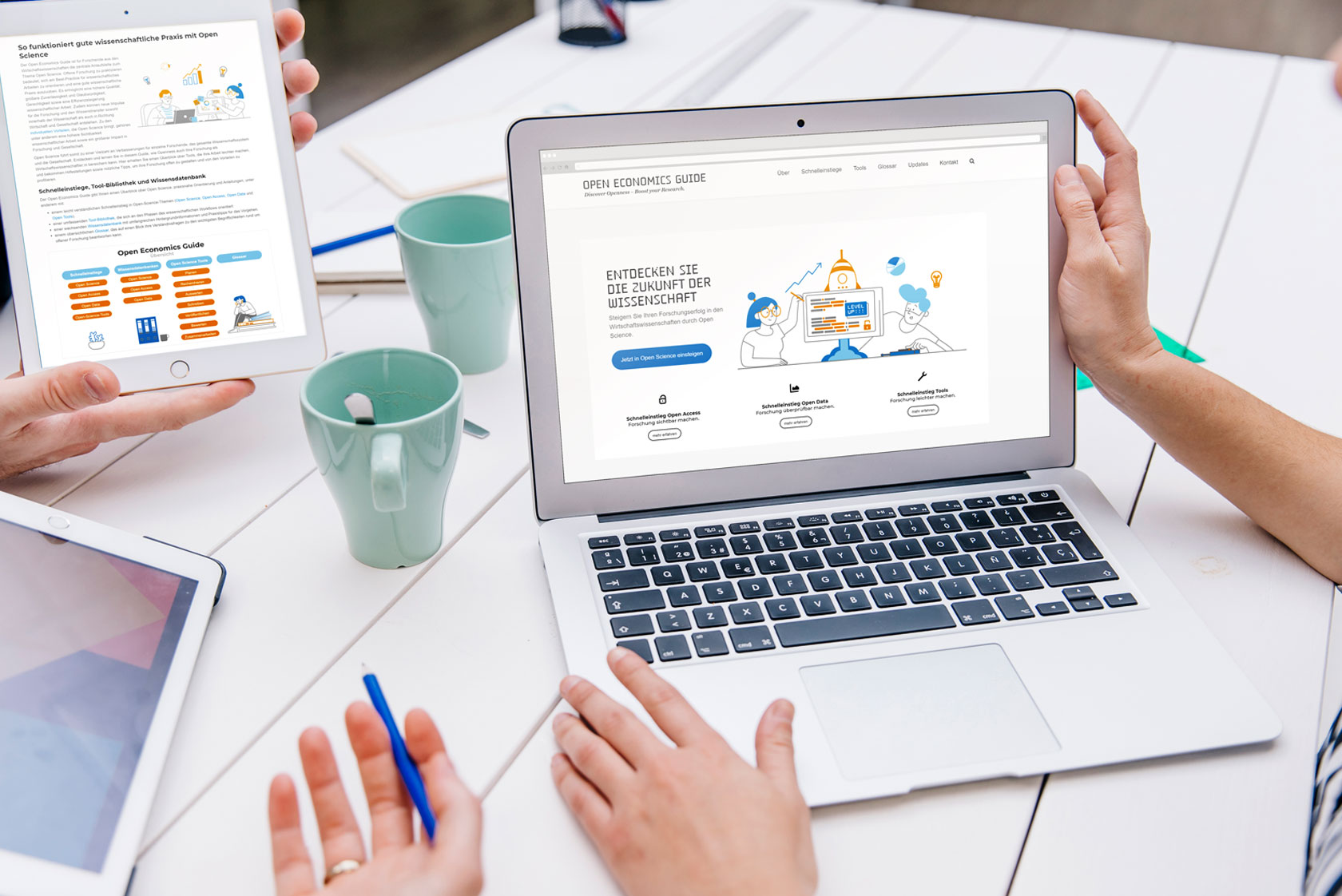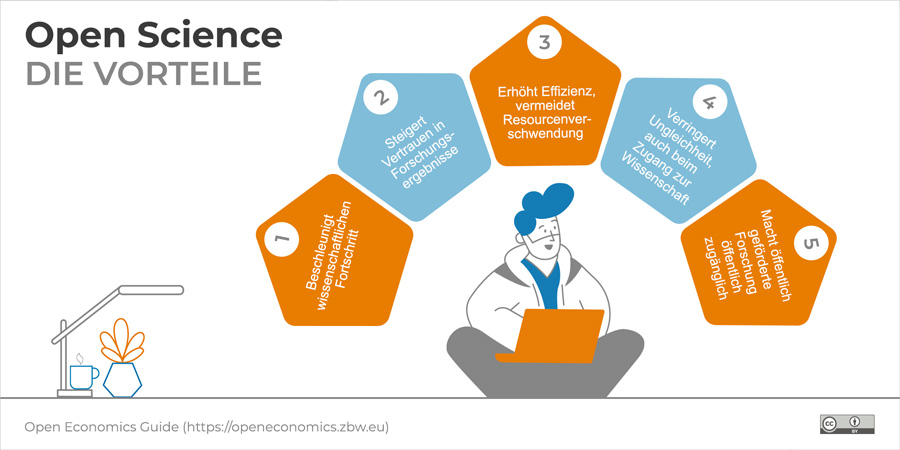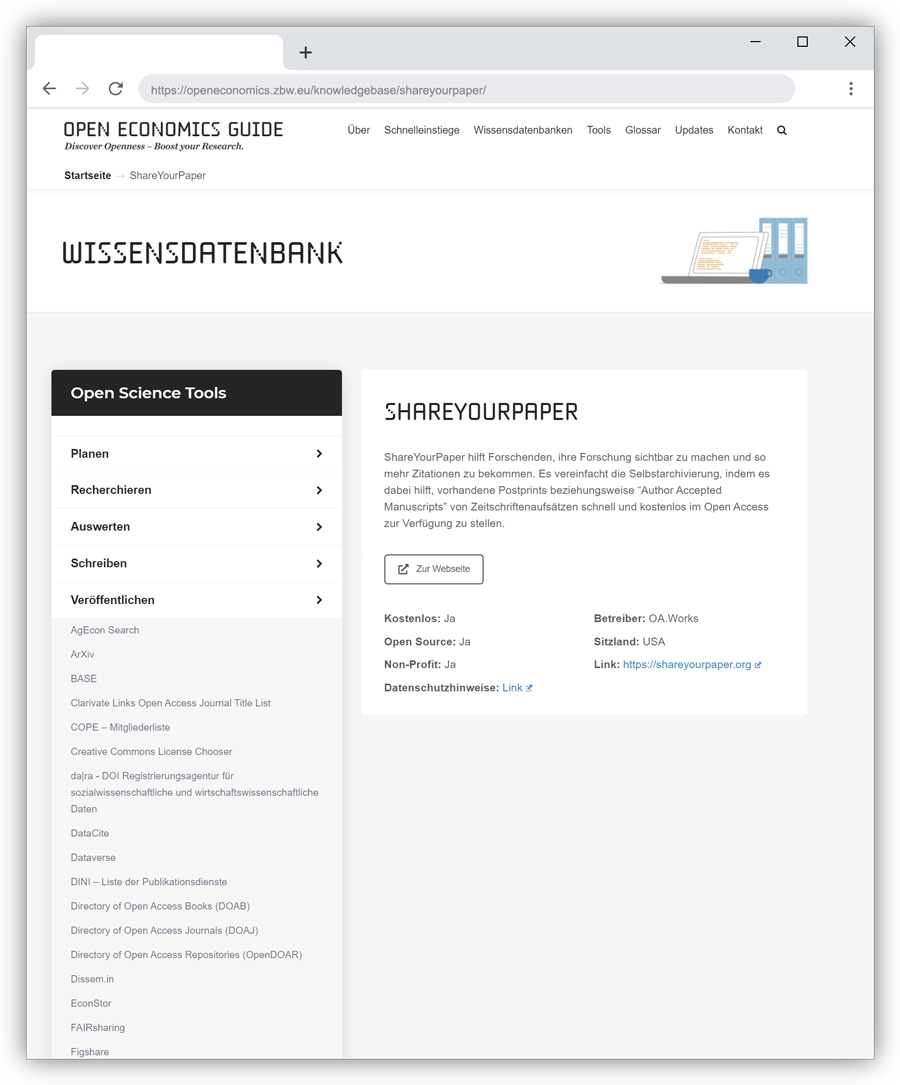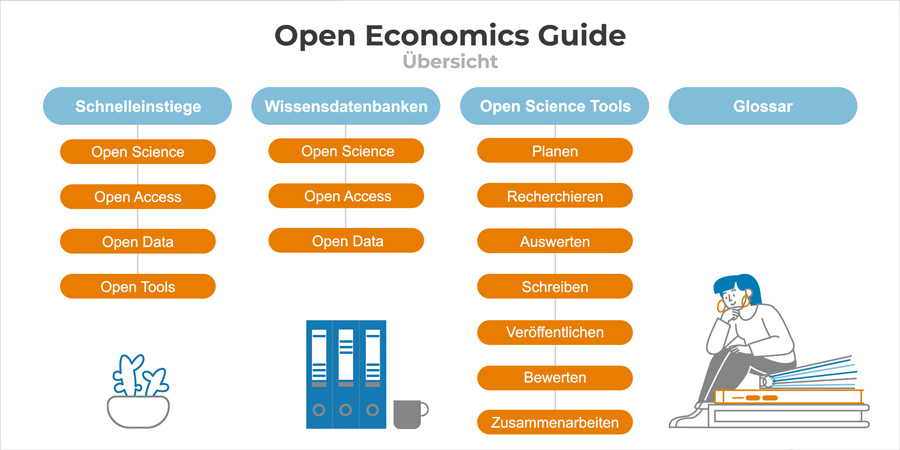
Open Economics Guide: New Open Science Support for Economics Researchers
Despite many benefits of Open Science, several barriers still prevent researchers from opening up their research. Libraries can play an important role in helping them to implement Open Science. In order to overcome Open Science hurdles and provide support for successful Open Science practice, the ZBW – Leibniz Information Centre for Economics has developed the Open Economics Guide. We present the new service for researchers in economics and business studies, which the ZBW has now launched with the slogan "Discover Openness - Boost Your Research".
by Birgit Fingerle and Guido Scherp

Open Science represents the best practice for academic work and is a toolkit for “good scientific practice”. In addition to the general benefits of Open Science for the scholarly system and society, Open Science offers many individual benefits for researchers. Among them are a higher visibility of research work and a greater impact in research and society.
Nevertheless, many researchers in economics and business studies see hurdles and are discouraged from practicing Open Science: A lack of time and of appropriate support are the main reasons for their hesitation. This was revealed by the 2019/2020 study “Die Bedeutung von Open Science in den Wirtschaftswissenschaften – Ergebnisbericht einer Online-Befragung unter Forschenden der Wirtschaftswissenschaften an deutschen Hochschulen 2019” (“The Importance of Open Science in Economics – Result Report of an Online Survey among Researchers in Economics at German Universities 2019”) conducted by the ZBW. See our blog post Open Economics: Study on Open Science Principles and Practice in Economics reporting the studies main findings. Furthermore, the survey on which the study was based expressed a strong desire for support in the form of online materials, especially with regard to Open Science platforms, tools and applications.
With the new Open Economics Guide (German), the ZBW aims to address these wishes and to support economics and business studies researchers in implementing open practices.
Support for open science practice
The Open Economics Guide addresses the challenges and support needs identified in the study. It is based on the perspective and the needs of economics and business studies researchers. It takes into account, for example, that for them lack of time is the top obstacle to Open Science. This is why the texts of the Guide are concise and clear. Therefore, the Open Economics Guide starts with concrete benefits for researchers, for example by recommending first steps for getting started with Open Science easily and quickly to implement.
Accordingly, where necessary, the content reflects the specifics of economics and business studies research. The Open Economics Guide is also based on systematically reviewed existing content, which it picks up or refers to and recommends where necessary. Since the range of information, tutorials and tools related to Open Science is constantly growing, the Open Economics Guide offers good orientation for researchers and takes up current developments.
The ZBW has thus designed the Open Economics Guide as the central entry point specifically for Open Science in economics and business studies, initially for German-speaking countries. In the Open Economics Guide, economists can discover how openness enriches their research and how they can benefit from the advantages of open research.
Quick start, tool overview and knowledge base
The Open Economics Guide supports economics and business studies researchers with practical tips, methods and tools to practice Open Science independently and successfully and thus to promote their academic career. To this end, the Guide contains, among other things:
- easy-to-understand quick-start guides to Open Science topics (currently Open Science, Open Access, Open Data and Open Tools),
- a comprehensive overview of more than 70 tools (German), subdivided by the phases of the research workflow,
- a growing knowledge database with currently about 100 entries (German) with extensive background information and practical tips on how to proceed,
- a clear glossary (German), which answers comprehension questions about the most important terms related to open research at a glance.
Content under open license and further expansion
The content of the Open Economics Guide is offered under an open license as far as possible. Thus, it can be reused in other contexts according to the principles of Open Science, for example by other libraries for their researchers.
The Open Economics Guide will be continuously expanded and extended. For instance, further focal points, such as Open Educational Resources and Open Research Software, will be added. All aspects of Open Science relevant to economics and business studies research will be covered. In doing so, a close communication as well as a close cooperation with researchers of economics and business studies will be strived for, in order to develop new contents also jointly. In addition, the guide will aim at an international target group in the future.
Dr Guido Scherp is Head of the “Open-Science-Transfer” department at the ZBW – Leibniz Information Centre for Economics and Coordinator of the Leibniz Research Alliance Open Science. He can also be found on LinkedIn and Twitter.
Portrait: ZBW©, photographer: Sven Wied
Birgit Fingerle holds a diploma in economics and business administration and works at ZBW, among others, in the fields innovation management, open innovation, open science and currently in particular with the “Open Economics Guide”. Birgit Fingerle can also be found on Twitter.
Portrait, photographer: Northerncards©
Featured Image: Mockup created by freepik – www.freepik.com
View Comments

Why Libraries Have to be Permanently Active on Social Media: 7 “Glorious” Reasons – 2021 Update
Credibility as a digital provider, direct communication with user communities and...






